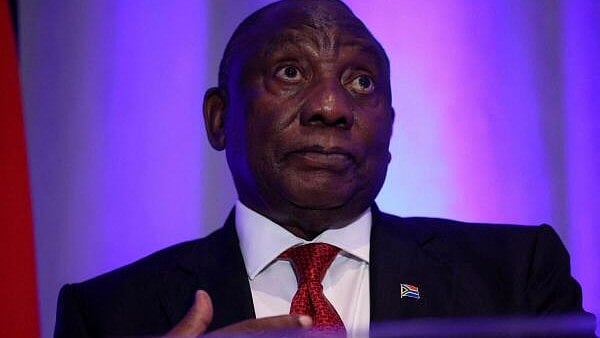
During a strained interaction between Trump and South Africa's Ramaphosa, the former rebuked Ramaphosa over his government’s inability to prevent a white genocide.
Credit: Reuters Photo
The highly anticipated meeting between South African President Cyril Ramaphosa and United States President Donald Trump at the G7 summit did not take place, despite indications that the two leaders may hold bilateral discussions on the sidelines. Key issues slated for discussion included the realignment of BRICS, trade negotiations and approaches to international conflict resolution.
The meeting was also seen as a potential opportunity to alleviate recent diplomatic tensions between the US and South Africa following a strained interaction between the two leaders on May 21 when Trump rebuked Ramaphosa over his government’s inability to prevent a white genocide.
This notion of ‘white genocide’ in South Africa, the idea that white farmers are being systematically targeted and murdered, however, is not supported by data or on-the-ground realities. Instead, it grossly oversimplifies the country’s complex social and economic realities while overlooking a much more pressing and devastating issue: the rise of xenophobia targeting Black African migrants.
While it is true that South Africa has seen episodes of violence against white farmers, most are not racially motivated. Crime, including farm murders, affects people of all races in a country grappling with high levels of violent crimes. White South Africans, particularly farm owners, face security threats. Still, these are largely a product of broader law enforcement challenges and socioeconomic breakdowns, not an orchestrated campaign of racial extermination. In fact, white South Africans continue to control much of the country’s wealth and land, and enjoy a standard of living substantially higher than that of the average Black South African or African migrant.
By contrast, the real victims of widespread, systemic xenophobic violence in South Africa are poor Black migrants from other African countries, primarily Zimbabwe, Mozambique, Malawi, Somalia and Nigeria, who have borne the brunt of physical attacks, economic exclusion and political scapegoating. Their experiences point to a form of grassroots-level xenophobia that is far more prevalent and dangerous than the ideologically driven fearmongering surrounding ‘white genocide’.
Xenophobia in South Africa is not new. However, it intensified significantly after the country’s post-apartheid economic hopes began to sour after 1994. The African National Congress (ANC), which had long championed a Pan-African ethos and the free movement of people across the continent, increasingly struggled to deliver on promises of economic justice and equity. As economic growth stagnated and unemployment soared, public frustration mounted. Today, more than 60% of the country’s youth are officially unemployed. With few meaningful outlets for their anger and despair, migrants — and not white farmers — have become convenient scapegoats.
Migrants are accused of “stealing jobs”, “flooding the healthcare system” and “running criminal syndicates”, even though many of these claims lack evidence. Their contributions to the economy, especially in informal sectors, are conveniently ignored. Migrants are blamed for everything from unemployment to drug use, although systemic inequality, corruption and failed policy reforms are far more responsible for these problems.
The emergence of movements like Operation Dudula, which means “push out” in Zulu, symbolises this growing hostility. What started as community patrols targeting undocumented immigrants has evolved into an organised political movement, often harassing foreign nationals, demanding their deportation, and staging raids on migrant-run businesses. Despite winning just a fraction of the vote in the 2024 elections, Dudula and similar movements have shaped political discourse, pulling the centre of gravity rightward on immigration and border policy.
Over time, more mainstream parties began co-opting this anti-migrant rhetoric. While the ANC officially maintained its Pan-African stance, in practice, it became harder to distinguish its messaging from that of more overtly nationalist and exclusionary groups. In 2022, then transport minister Fikile Mbalula publicly blamed migrants for rising unemployment.
The worst manifestations of this xenophobia occurred in 2008 and 2015, leaving dozens dead and displacing thousands. Somali, Nigerian and Zimbabwean migrants saw their shops looted, homes burned and friends murdered, often in front of police who either looked the other way or participated in the abuses. These attacks weren’t perpetrated by government officials or soldiers but by ordinary citizens, a chilling reflection of how deeply resentment towards outsiders had taken root.
The danger of this trend cannot be overstated. South Africa was once seen as a beacon of post-colonial hope, a country that, after decades of racial oppression, emerged with one of the most progressive constitutions in the world. But the gulf between its ideals and realities is widening, and the cost of not righting the ship has started emerging. The country’s future stability depends not on reinforcing narrow nationalism, but on confronting the structural issues, i.e. inequality, lack of opportunity, and governance failures, which lie at the root of both xenophobia and broader social discontent. The story of modern South Africa is not one of white genocide, but of a country turning its back on the very principles of solidarity and liberation that once defined its struggle for freedom.
(The writer is associate fellow, Observer Research Foundation)